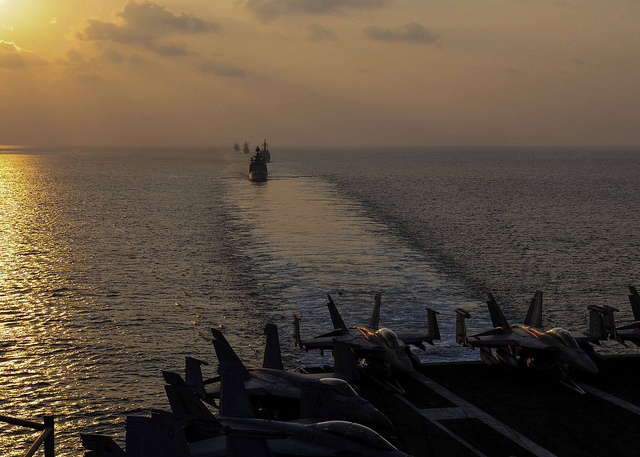Sea State
On Saturday, naval warships, aircraft carriers and submarines from the US, India and Japan streamed into the Bay of Bengal as part of the Malabar exercises. A joint press release from the three countries claimed that Malabar-15 would be ‘another significant step in strengthening mutual confidence and inter-operability as well as sharing best practices between the Indian, Japanese and US navies.’ This year is the first year that Japan will participate as a permanent member of the Malabar exercises, having partaken as a foreign invitee in previous years.
Canada’s navy is in talks with its Spanish counterpart to deploy a Spanish replenishment ship with the Canadian fleet in the North Atlantic. Spain’s Cantabria AOR (which previously saw service in support of the RAN) has been identified by the Ottawa Post as the ship that the Royal Canadian Navy is interested in leasing. The ship is set to be deployed in 2016, and according to the Spanish Navy, it would ‘cover the Canadian navy’s temporary need of logistic support vessels’.
It’s been a busy weekend for the Chinese government as they’ve sought to use the Xiangshan Regional Defense Forum hosted in Beijing as an opportunity to downplay US fears regarding its building of artificial island in its surrounding seas. Speaking at the Forum, Fan Changolong, vice-chair of China’s Central Military Commission, said that China would ‘never recklessly resort to the use of force, even on issues bearing on sovereignty’. The Xiangshan Forum is a security dialogue China has recently upgraded as part of its efforts to increase China’s global defence influence.
Flight Path
In a showdown between China and Japan, who would win the battle of the skies? An article in The National Interest pits China’s first fifth generation Stealth fighter, the J20, against Japan’s F-15J Eagle fighter. China’s Chengdu J-20 is expected to be operational by the end of the decade, while Japan is still without a replacement for the ageing F-15J. So which one will come out on top according to the NI? Read the article here.
Want to fly the F-35? You’d better weigh more than 61kg (136 pounds). The latest issue to plague the US F-35 program is the discovery of an increased risk of neck damage when a lightweight pilot ejects from the plane at low speeds. Defense News suggests the increased risk of neck damage might be due to the heavy weight of the helmet, built by Rockwell Collins and Elbit Systems of America, but it’s still unclear whether the fault lies with the helmet, the ejection seat or another undetermined factor.
Wrapping up Flight Path this week, War is Boring takes a look at Russia’s mysterious Il-76 airlifter flying over Syrian airspace. Was the airlifter resupplying the Syrian military or fulfilling a non-military purpose?
Rapid Fire
Major Lisa Jaster, a 37 year-old mother of two and a major in the US Army Reserves, will become the third woman to graduate from the US Army’s elite Ranger School. The Ranger course, which first became available to women in 2013 after the Obama administration’s decision to open up combat roles to females, includes several notoriously gruelling fitness tests. Read more about Major Jaster’s journey here.
In Washington, the US State Department has approved a possible Foreign Military Sale of nine UH-60M Black Hawk helicopters to Saudi Arabia. Last week the Defense Security Cooperation Agency delivered the required certification notifying Congress of the possible sale. Valued at US$495 million, the deal would include nine helicopters, 21 T700-GE-701D engines built by General Electric Co, embedded GPS systems, machine guns and missile warning systems.
Amid fears that Stryker-equipped US Army units in Europe don’t match up to their Russian counterparts, General Dynamic Land Systems are fast-tracking efforts to mount a medium-caliber cannon on a portion of the fleet. The upgrade will involve 81 vehicles, and is expected to be completed by 2018.


